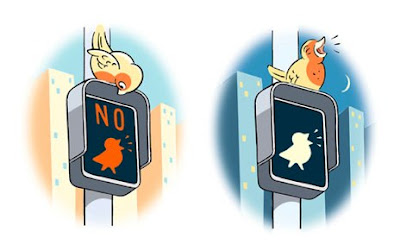A blog devoted to exploring the "all-sound music of the future" predicted by John Cage.
Friday, August 12, 2016
Same Old Song: Humans Are Too Loud, and It's Ruining Everything
I know I've written about this before. A few times. Quite a lot, actually.
But it bears repeating.
Humans make a lot of noise.
And it's messing things up for other animals.
The body of research suggesting that anthropogenic noise pollution has negative impacts on everything from birds, frogs, fish, insects, prairie dogs to even organisms without ears, is steadily mounting. Increasingly, human noise is being recognized as a form of habitat degradation, while at the same time we're uncovering the acoustic environment’s importance to wildlife — to behavior, communication and ultimately survival.
The fossil record reveals that animals developed ears before vocal chords. This is basically the paleontological equivalent of your grandmother reminding you that you have two ears and one mouth. Hearing is the universal alerting cue, an essential sense that’s never been seen to disappear in any species. From a zoological, evolutionary perspective, hearing is far more universal than vision, suggesting it's very important to a species' survival.
And that's where the human-generated cacophony becomes a problem. When animals' acoustic environments are altered, they must respond in order to function in a new sound environment. Animals respond to noise in many different ways, and scientists are just beginning to understand the ramifications. Some responses are behavioral and can be observed in changes in species' communication. Others show up in where animals choose to make their habitats, how successfully they fend off predators (or not), or their ability to hunt (or not) — or in subtler impacts on mating, reproductive success and physiological stress.
And, of course, as with all changes in an ecosystem, how stress is handled by one species affects all the other species in the system. Cascade affects can impact how and whether plant species are pollinated, their seeds dispersed, their populations kept in check by herbivores.
Birdsong decreases in complexity. And that's sad. That is sad, people.
Basically, human noise creates environmental stress, and animals either have to adapt, or die.
Which is a problem.
On the bright side, noise pollution is an easy problem to immediately clean up. Unlike other nasty pollutants with half-lives of millions of years, noise pollution can be made to disappear. Just like that. Really.
On the other hand, humans are still going to be all over the place, probably doing things that make noise. Noise cloaking technologies, sound-sensitive highway designs, even speed limits for boats (to protect poor whales' ears) can be developed and implemented to address this problem. But like all problems, the first step to recover is acknowledging that the problem exists.
It's the very ephemeral nature of sound, and the ease with which such a pollutant can be "cleaned up" that keeps it from being a priority when developing policy. Research on the impacts of anthropogenic noise on wildlife has only gained traction in the last 10 years. Until we can admit that the noise humans produce — from road traffic, airplanes, boats, fossil fuel extraction, mining, military activity, home air conditioning and other sources — is a widespread pollutant, we can't begin the process of cleaning it up.
*author jumps of soapbox and exits stage left*
Image by Chris Gash @ http://www.chrisgash.com/
Subscribe to:
Post Comments (Atom)

No comments:
Post a Comment